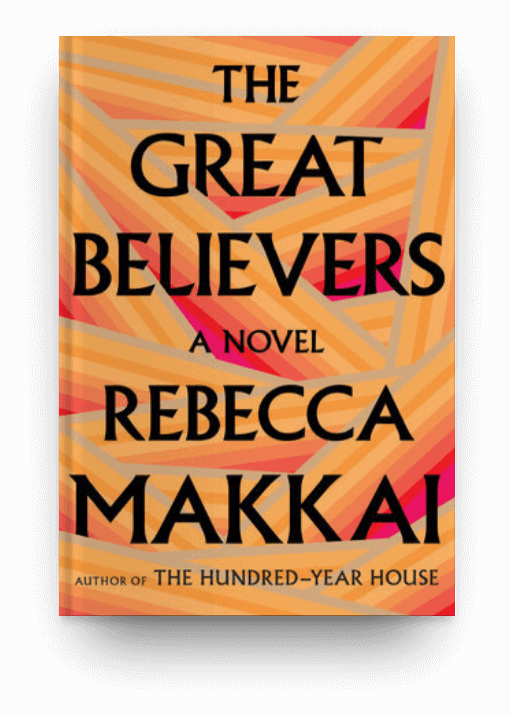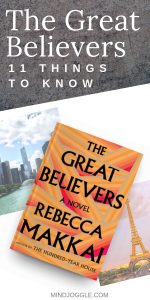11 Things to Know About The Great Believers: The Story of the Story
The story of the story behind the highly acclaimed 2018 novel The Great Believers by Rebecca Makkai, set during the 80s AIDS crisis and 2015 Paris.
This post may include affiliate links. That means if you click and make a purchase, I may earn a small commission. Please see Disclosures for more information.
Of the fifteen books that made my best books of 2018, The Great Believers by Rebecca Makka topped them all as my favorite. This novel has all the elements that I love in a book: a story told over the decades, life-defining friendships, social relevance, and characters that come alive.
The Great Believers is not an easy book to read; it is, after all, about the AIDS crisis in the 80s. It brings the crisis close; along with the characters, you, the reader, experience the fear, the sadness, and the many indignities that came with this terrifying and mysterious disease.
My Review of The Great Believers
The Great Believers
Set in two time periods, the first in 1980s Chicago and the second in 2015 Paris, The Great Believers throws readers into the thick of–and the aftermath of–the 1980s AIDS crisis. From a group of young men in Chicago's gay community to the people they left behind, mourning the loss of so many, this is grief on a large scale.
Makkai masterfully juxtaposes the AIDS crisis with several other tragic events, including world wars and terrorist attacks. These, as well as a thread about historical art, are brilliantly woven together to highlight the generations of people and talents lost to these devastations.
For more on this book, check out 11 Things to Know About The Great Believers: The Story of the Story
More info →11 Things to Know About The Great Believers
1. The original plan.
Rebecca Makkai did not originally set out to write a novel about the AIDS crisis. The subplot of the book involving Nora, an elderly woman who was an artist’s muse in the 1920s Paris art community, was originally the focus. Makkai started getting interested in the “art guy” she was talking to, who became the character Yale Tishman. (1)
2. The current events affecting the story.
Makkai was writing Fiona’s story, set in 2015 Paris, when the 2015 terrorist attacks happened there. It wasn’t something that could be left out of a story set in Paris in 2015. Moving the timeline presented its own set of difficulties, so she needed to incorporate the attacks into the story. She says:
“Ultimately, it worked for me because this wasn’t just a character-driven novel where all the conflict comes out of people’s own flaws; it’s a novel about the ways the world comes at you no matter who you are or what you do.” (3)
3. Tracking events while writing.
Makkai keeps a Google calendar of major world events set during the years in which her novels are set. That’s how the Challenger explosion came to be part of The Great Believers–it was an event that definitely would have affected the characters. (3)
4. The sense of obligation.
Makkai worked on the novel over four years. When asked what kept her motivated, she responded that this photo was her computer wallpaper during that time.
“They kept staring at me.” (3)
5. The research process.
Very little was written about the AIDS crisis in 1980s Chicago–most nonfiction accounts were in New York and San Francisco. Makkai used a lot of primary sources for her research, including gay weeklies published during the crisis and interviews with survivors and caregivers. (4)
6. The favorite character.
One of Makkai’s favorite characters in the book is Julian.
“He’s that friend everyone has who’s kind of stupid but they love him anyway. Somehow he came really easily to me; he was someone who just sort of presented himself in scene. I was writing that initial memorial party scene and I didn’t know particularly that this was going to be a long term character, I just needed to write someone coming up and greeting Yale—and this guy emerged as a tremendous flirt and very silly and very fun and then became a really major part of the book—to the point that I thought for a while about making him the narrator of it.” (5)
7. The disparate elements brought into one story.
The cult storyline (in which Fiona’s daughter joins a cult) was born out of previous research on cults for a short story that Makkai said, “didn’t quite work.” It’s part of an overall writing approach that she advises her students to use:
“When I’m talking to students who are stuck in their work, my advice is often to find other things they’re passionate about and introduce those into the mix. Tunnel vision never helped anyone’s novel. All those different elements were things I’d been wanting to write about.” (6)
8. The balancing act.
The complex structure–multiple time periods and locations ranging from Chicago to Wisconsin to Paris in the past and present–was as difficult as you might expect. The elegance of the final story is deceiving:
“At one point, three days before it was due to my editor, I decided I needed to wildly redo the structure. I had pages all over my office floor, and tiny shreds of color-coded notecards, and I was incapable of human conversation. I put it all back together again, and it worked.” (7)
9. The forthcoming screen adaptation.
Amy Poehler has optioned The Great Believers for television. There is not currently a network or writer attached. (2)
10. The support for AIDS organizations in Chicago.
Makkai ran a fundraising campaign in 2018 to support Vital Bridges, a Chicago-based food pantry and free grocery store for people with HIV and AIDS. Participants who purchased the book could take a photo with it and post it to Twitter or Instagram with the hashtag #TheGreatBelieversDonate. For every post, Rebecca Makkai donated $1.
11. The accolades.
The Great Believers was recognized with the following nominations, awards, and accolades:
- Finalist for the 2018 National Book Award for Fiction
- Winner of the Andrew Carnegie Medal for Excellence in Fiction for 2019
- Named one of the best books of the year by the New York Times, Publisher’s Weekly, Goodreads, Washington Post, and the New York Public Library
- NPR Novel of the Year
Sources
Books Like The Great Believers
If You Loved The Great Believers, You Might Also Like:
- A Little Life by Hanya Yanagihara
- Tell the Wolves I’m Home by Carol Rifka Brunt
- The Heart’s Invisible Furies by John Boyne
Related: 11 Devastating Books Like A Little Life
Also by Rebecca Makkai: The Borrower
The Story of the Story Series
I began the “Story of the Story” series in 2018 as a way to learn more about the stories behind the books I love. I’m interested in what motivated or inspired the author, how they worked, how plans may have changed along the way, and future plans for film or television adaptations–or sequels.
The series faltered a bit last year, but I hope to do more of these posts in 2019. Let me know if there are any books you’d like to see covered in this series!



I love this series! It’s fun to learn more about these books. I haven’t read this one, but I’m adding it to my TBR.
Thank you! I’m glad you like it. Definitely pick it up if you get a chance–it’s so well done!
I love this series! Love hearing all the little tidbits of behind the scenes info. These must take you awhile to research.
Thanks! It does take a while–I have to do it in bits and pieces. It is fun, though, to read the different things that come to light in the various interviews. I’m glad you enjoy it, too!
I agree with the others that this is a terrific series! It’s fascinating to learn more about these books. I’d love to see any of Fredrik Backman’s books or maybe a popular new release that’s coming out this year…
Thank you! I was actually considering some of Backman’s books–glad to know there’s interest! I will definitely keep my eyes on the new releases as well and see what might be a good fit.
I love it, Allison. I learned so much from you about the book that was also my favorite book of 2018. It’s so interesting to hear about how her story evolved throughout her writing process. And the use of Google calendar for major events is something I’d never have thought of, but SO smart. Terrific series idea.
Thank you, Susie! I’m so glad that other people find this behind-the-scenes info as fascinating as I do. I agree about the Google calendar. It’s probably easy to get so wrapped up in your story that you forget the coinciding world events without some reminders!